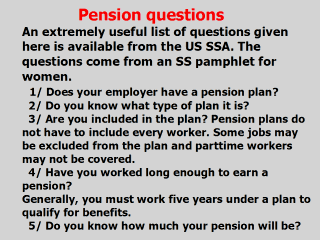| front |1 |2 |3 |4 |5 |6 |7 |8 |9 |10 |11 |12 |13 |14 |15 |16 |17 |18 |19 |20 |21 |22 |23 |24 |25 |26 |27 |review |
 |
6/
Do you know what happens to your pension if you change jobs?
If you qualify for benefits, some plans will keep your pension until you
reach retirement age. Others will allow you to take your money out. 7/ Do you know what happens to a pension if you or your spouse dies? In a traditional private pension plan, you may be entitled to receive a benefit from your spouse's plan when he dies. This survivor benefit is automatic unless both spouses agree, in writing, to give it up. 8/ Is your pension insured? Most traditional company and union pension plans are insured by the federal government through the Pension Benefit Guaranty Corporation (PBGC). PBGC pays benefits up to a maximum guarantee if plans fall short. 9/ Do you have pension information from all your jobs? If you earned a pension at a previous job, contact the plan to get information on your benefit. Also, when you apply for SS, you can find out what private sector pension benefits you may have earned. Finally, contact PBGC for help in locating your benefits from a private sector plan that no longer exists. Be sure to keep all employment, tax and pension-related records with your other important papers. 10/ Do you know what benefits your spouse's plan provides? 11/ Are you entitled to a portion of your spouse's pension benefit if you get divorced? 12/ Do you know the SS benefits to which you may be entitled? Your SS benefits will be based on your earnings during your working career. 13/ Can my pension benefits be reduced by SS or other government payments? 14/ Do you know how you can save for retirement if you do not have a pension plan? Anyone with earned income can put money into an Individual Retirement Account, or if selfemployed can establish a Simplified Employee Pension or "Keogh" plan. 15/ How to find out more |